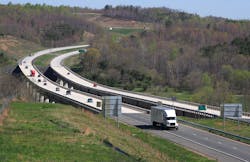Many transportation challenges ahead, new AASHTO exec says
Establishing “sustainable” sources of transportation funding, supporting further multi-modal connections to improve the flow of freight and commuters, while continuing to address a “traffic safety epidemic” are only some of the major issues Frederick G. "Bud" Wright plans to address as the newly-installed executive director of the American Association of State Highway and Transportation (AASHTO).
“We’ve got a lot on our plate,” Wright explained yesterday in a conference call with reporters. “There are many significant challenges the transportation industry needs to address.”
He also noted that implementing provisions of the Moving Ahead for Progress in the 21st Century Act or “MAP-21” that directs federal spending and regulatory efforts in the transportation sector is being complicated due to its short-term nature.
“We were very pleased with many of the provisions in MAP-21, especially how it allowed the states to more broadly pursue an array of funding mechanisms for transportation projects, such as tolls,” Wright said. “But MAP-21 only lasts for two years, and the reality is we’re still in the middle of implementation its provisions as we begin the reauthorization process.”
Wright – who spent his entire four decade career in the transportation industry, serving a stint as executive director of the Federal Highway Administration (FHWA) from 2001 to 2008 – added that establishing “sustainable” sources of funding will be one of AASHTO’s top goals moving forward, picking up on themes established by his predecessor John Horsley.
“We’ve got a number of options on our funding ‘shopping list’ including raising fuel taxes, using carbon-based fees, tolls, and other methods,” Wright explained. “We want to give states the flexibility to use multiple funding approaches; we’re not trying to push any one particular funding solution.”
He stressed, however, that the current fuel tax structure “won’t get us to where we need to be” because its ability to generate the necessary funds is “eroding over time.”
Wright – the seventh executive director to lead the nearly 100-year-old AASHTO organization – also noted that transportation strategy on issues such as funding can’t be delegated to the states entirely; indeed, he stressed that federal involvement remains critical, especially when it comes to freight.
“Much can be done by the states but some things just can’t,” he said, such as maintaining and expanding a national freight network. “It’s difficult to accomplish that if it’s just left to the states: that’s why we need a cohesive federal presence in transportation still.”
Improving highway safety is another arena where the federal government and states need to keep working together. “We’ve made a lot of progress over the last 10 years, but none of us should be happy that an average of 32,000 Americans dies on our roads every year,” Wright pointed out. “So it will still be important to look for aggressive strategies to reduce that death toll.”
He noted to Fleet Owner that highway infrastructure can play an important role in reducing traffic fatalities and injuries when it comes to how intersections are designed, for example.
“The investment in data systems and analysis by the federal government has also been important to this effort, because there’s no ‘one size fits all’ approach we can take to improve safety,” Wright added. “For example, that data analysis found that many traffic fatalities occur on less-traveled two-lane rural roads; we could not have identified that trend without robust data collection systems.”
About the Author
Sean Kilcarr
Editor in Chief
Sean Kilcarr is a former longtime FleetOwner senior editor who wrote for the publication from 2000 to 2018. He served as editor-in-chief from 2017 to 2018.
